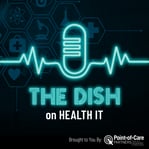Listen and Subscribe to Our Podcast
"The Dish on Health IT"
Engaging discussion around Health IT with perspectives from across the healthcare landscape. This informative and entertaining rotating panel of senior health IT consultants and their guests will keep you in the know about the latest innovations, policies and industry shifts impacting healthcare and point out the opportunities that lie within.

Subscribe on:
Apple Podcasts
Google Podcasts
Part 2, Episode 4: HIEs Now & Future
The discussion continues with guest, Dr. Tim Pletcher, Executive Director of the Michigan Health Information Network Shared Services (MiHIN) joins The Dish on Health IT panel of senior consultants, Gary Austin, Jocelyn Keegan and Ken Kleinberg to discuss the role of Health Information Exchanges in healthcare, their role in the response to COVID-19 and what role they can serve in the future once TEFCA is finalized.
Part 2 of the discussion jumps in with how MiHIN responded to COVID-19 by creating a separate group to serve public health needs during the crisis. MiHIN also created a telehealth service to better serve patients and support stay at home orders.
>Dr. Pletcher explained they acceleration the connections with labs and expressed his desire for results to be sent back via API instead of batch files to expedite results availability. Data links and analytics have taken on a whole new role during this time.
MiHIN has taken on a support role which may have pumped the brakes on some innovation projects but there has been opportunity to increase the priority of other projects that could directly positively impact the pandemic response.
Jocelyn explained why its so important to meet people where they are in order to make progress. This time is also a time for these simulated barriers to drop. She asked Dr. Pletcher how MiHIN is dealing with perceived security issues when working with innovation projects or partnering with new stakeholders.
Dr. Pletcher responded by saying that their biggest challenge right now are Quest and Labcorp because they don't like to share data but this will be resolved through government intervention. The issues generally are not technical issues but business issues with one partner either not wanting to share data or restricting how the data can be used.
The group went on to discuss how dropping the rules to facilitate the use of telehealth more readily will be a huge driver for change and innovation and hopefully the rules will remain suspended because patients should have more access via telehealth even over state lines.
>The conversation moved to data blocking with Gary pointing out EHRs are usually the ones getting the finger pointed at them for data blocking. Dr. Pletcher expressed that Epic or Cerner have never blocked or withheld data in Michigan so he doesn't know who it really is doing the data blocking.
Will the US do more around pandemic surveillance like Taiwan and South Korea? Will HIEs support something like? Ken pointed out that some people don't want to be tracked in this way and will opt out or avoid it, however, if it's the only way a person is allowed to get into a ball game or something, they likely will. Dr. Pletcher explained that opt-in and opt-out is an archaic concept. There is a much better framework which would allow patients to express a more granular desire of how they want their data to be used. Doctors have choices too and when patients consent to receive treatment, physician choices come into play.
The group highlighted where there are similarities between the financial and healthcare industries related to security and data access until the complexities of healthcare ends the similarities with identity being a major hurdle. With the explosion of patient apps, there is also a trust factor the that comes into play as far as understanding what data that can be obtained from patients apps can be trusted and whether they will look at HIEs as the consolidator of data vs going to Payers.




